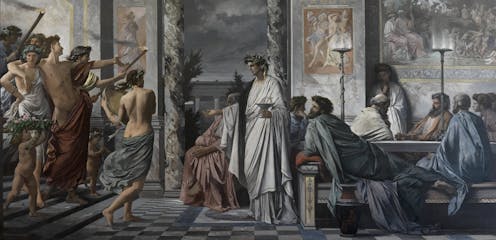What is Plato’s Symposium, the classic book drawn into the Gender Queer culture wars?
- Written by Matthew Sharpe, Associate Professor in Philosophy, Australian Catholic University

It was probably inevitable, but is deeply sad, that Plato’s Symposium (circa 380 BCE), has been drawn into the culture wars. A dialogue of great complexity and elegance, the book is one of the principal sources of the Greek philosopher’s views on love and beauty.
There are also darker political undertones of the decline of Athenian democracy, surrounding the character of Alcibiades who crashes the drinking party the book depicts. There is a lot going on in The Symposium, and a lot we can learn from.
An illustration of a sexual fantasy inspired by The Symposium features in Maia Kobabe’s graphic-novel memoir Gender Queer. This week, the federal court ordered the Australian classification review board to review its assessment of Gender Queer, finding it had ignored, overlooked or misunderstood public submissions for the book to be censored.
Rightwing activist Bernard Gaynor had applied to the board to review the classification of the book. Gaynor’s barrister, Bret Walker SC, argued in court there had been a “broadbrush dismissal” of submissions the board claimed were anti-LGBTQ+ when many submissions objected to what they saw as “paedophilic” depictions of a man having sex with a minor – an image portraying Plato’s Symposium.
Plato’s work comes from a different culture to our own. This was a culture in which, at least among aristocratic males, there were norms around sexual morality that are not our own.
In this context, as Michel Foucault has shown in The History of Sexuality, there were norms surrounding same-sex relationships between elder and younger men that many contemporaries will find deeply morally problematic. But this does not detract from the book’s importance, nor does it exhaust the work’s content.
Far from it.
Love, beauty, and Plato
The Symposium, as its title reflects, is a dialogue between seven leading figures in Athens, set in the controversial year 416 BCE. This was the year in which Athens, spurred on by the charismatic, hawkish demagogue, Alcibiades, sent its navy fatefully to invade the Italian city of Syracuse.





